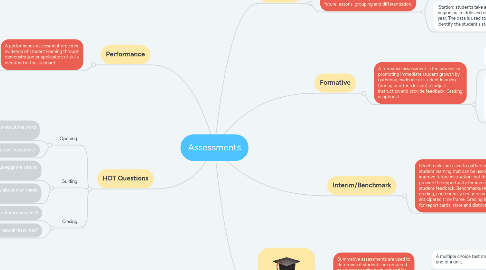
1. Performance
1.1. A performance assessment provides evidence of student learning through demonstration or application of skills identified in the standard.
1.1.1. Students may partition construction paper into equal parts to demonstrate their understanding of this standard during 2nd-grade.
1.1.2. TCs participate in 4 Performance Assessments during this program, where we conduct a lesson in the given subject, and are assessed on our skills of each NIET indicator.
2. HOT Questions
2.1. Opening
2.1.1. What do we know about the word 'Resource' ?
2.1.2. What are Natural resources?
2.2. Guiding
2.2.1. What facts or ideas tell us eggs are natural resources?
2.2.2. What could you say about man-made resources?
2.3. Closing
2.3.1. How can we conserve natural resources?
2.3.2. Why should we conserve natural resources?
3. Interim/Benchmark
3.1. Benchmarks are used to gather evidence of student learning that can be used to improve future instruction, but does not provide the opportunity for immediate student feedback. Benchmarks require grading, and normally occur on an anticipated time frame. Grading is required for report cards, state and district reports.
3.1.1. Benchmarks: Every 6-8 weeks a grade level will usually have a highly anticipated Benchmark test that will test all previously taught concepts in the given subject.
3.1.2. STARR Test: Towards the end of the school year, this standardized test is given to all students starting from 3rd-Grade, and will assess their mastery of the content taught during the school year.
4. Diagnostic
4.1. Diagnostic assessments are given at the beginning of a course to determine the achievement gaps and abilities of students. Teachers use the data provided to plan future lessons, grouping and differentiation.
4.1.1. Running Records: Students' reading levels are assessed at the very beginning of the school year, middle and end of the school year. The data is used to group students by reading level for tutoring and intervention groups.
4.1.2. iStation: students take an online quiz at the beginning, middle and end of the school year. The data is used to track growth and identify the student's starting point.
5. Formative
5.1. A formative assessment is the process of promoting immediate student growth by gathering evidence of student learning (during or after a lesson) to adjust instruction and provide feedback. Grading is optional.
5.1.1. Quiz: Students may complete a brief, low stakes multiple choice quiz at the end of a lesson.
5.1.2. Class discussion: The teacher may lead a brief group discussion
6. Summative
6.1. Summative assessments are used to determine if students are prepared to advance to the next unit and/or grade level. Grading is required for report cards, state and district reports.
6.1.1. A multiple choice test may be given at the end of a unit.
6.1.2. Students may create a brochure about the 3Rs (Reduce, Reuse, Recycle) at the end of a research project.

